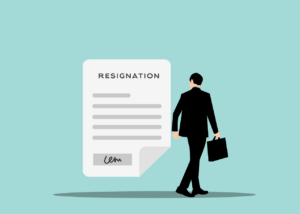
Some people, especially young employees, complain about the fact that they cannot work in the same place for a long time. It would seem a strange situation, but, nevertheless, for many job seekers it is relevant.
And what happens as a result? Such people, after working for some time, say, one year, quit and again find themselves in a job search situation.
Then, having found a job sooner or later, after working for a few more months in another company, they leave that company as well. And then the job search and employment process starts all over again.
Why does this happen? Why do these people not stay long at one workplace? After all, it is very inconvenient. Not to mention the risk of being labeled a “job-hopper” by employers.
So, let’s get to the bottom of it.
Possible reasons for frequent job changes
1. You do not like the work.
To be willing to work, you need to like the work. You must get up every day and go to work with the desire to continue what you have been doing lately, to achieve some results and get satisfaction from it.
If your work does not evoke in you some positive emotions, then soon enough the thought of quitting will arise, and workdays will become endless and tedious.
2. You are not satisfied with the level of pay.
Of course, just liking the job is not enough. Of course, there are exceptions, but for most people it is essential that they are paid appropriately.
If a person sees that he or she is not sufficiently appreciated financially, it leads to a decrease in interest in the work, and eventually the decision to change the job to a better-paying one.
3. You are bored with the job.
Work can be of many different types. It is often routine, and, of course, the same monotonous actions performed from day to day, can easily get boring. True, it depends on the person himself, his individual characteristics and character.
It is clear that each of the above reasons can level the desire to work, at least in some people. Nevertheless, before quitting, you should properly weigh the pros and cons. After all, frequent job changes can cause you a lot of problems both now and in the future. Not to mention the fact that losing your job in a crisis is highly undesirable.
What are you risking? And here’s a look!
Why it is undesirable to change jobs frequently
1. You will have trouble getting a job.
At every job interview, you will probably be asked the same question – why you have been working at this or that place for so short a time, and why you change jobs so often in general.
It is necessary to take into account that this question is one of the most difficult ones, and it will be quite difficult to find an answer that would satisfy employers.
Moreover, it is not a fact that you will be invited to an interview. The employer may reject your candidacy, realizing from your resume that you are a job-hopper. Employers do not like job-hoppers very much.
2. You will not have serious achievements in your work.
It takes time to achieve any significant results in your professional life. Taking into account that first you need to get into things, then start working on a project or direction, gain clients, etc., the results will take time and probably a lot of time. If you quit your job after a few months or even a year, you probably won’t get decent results.
And in the absence of achievements in work, we return to the previous point – problems with employment. After all, the lack of success in work will be another critical disadvantage when evaluating you as a potential employee.
The value of a job seeker who has practically no achievements in work and is also a job-hopper is extremely low in the eyes of an employer or recruiter.
3. You will not have time to gain sufficient experience in each area, develop key skills for your specialty, and earn a reputation in the marketplace.
Similarly, as with professional achievements, a short time in the company will not allow you to gain or tangibly improve your experience and labor skills. The same goes for developing connections with colleagues, partners, clients, experts, top managers, entrepreneurs in the field where you work.
In a new job at another company, it may be a slightly different niche with different experience and social circle.
But even if you go to work for direct competitors and stay strictly within the same professional circle of communication, frequent change of work is still a “minus”, because it does not contribute to the formation of a reputation of a good specialist in your field.
What to do to reverse the situation with frequent changes of jobs?
Let’s go back to the root causes of frequent job changes. Work may really be unloved, low paid or boring. So, what should you do to avoid this situation?
Tips for those who change jobs frequently:
- Get your priorities right when looking for a job.
- Look for a job according to your priorities and criteria.
- Do not agree to work for a company if you are not interested in the job.
- f you are of the nature that you need something new all the time, look for a job where you can prove yourself.
- If you find yourself working in a job that you have lost interest in, try not to quit, but to achieve some results in your work first.
- Do not quit a boring job without finding a new one.
Use our recommendations and find a job where you won’t have any thoughts of quitting, but which, on the contrary, will allow you to fulfill your full potential.









